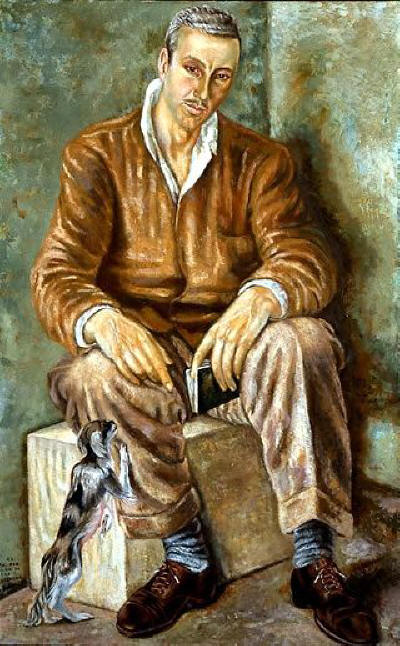

 Diego de Mesa (Madrid, 1912 - Rome, 1985)
was a writer and translator. son of the modernist poet Enrique de Mesa. Educated at the Instituto Escuela de Madrid, in this center he coincided with the young teacher María Zambrano, one of his most enduring friends. After performing diplomatic and military work during the civil war, he went into exile in Mexico in 1939, a country in which he joined both the circles of the Republican exile and those of prominent Mexican artists and creators (Juan Soriano, Leonora Carrington, Jaime García Terrés, Elena Garro, Carlos Mérida...).
Diego de Mesa (Madrid, 1912 - Rome, 1985)
was a writer and translator. son of the modernist poet Enrique de Mesa. Educated at the Instituto Escuela de Madrid, in this center he coincided with the young teacher María Zambrano, one of his most enduring friends. After performing diplomatic and military work during the civil war, he went into exile in Mexico in 1939, a country in which he joined both the circles of the Republican exile and those of prominent Mexican artists and creators (Juan Soriano, Leonora Carrington, Jaime García Terrés, Elena Garro, Carlos Mérida...).
Diego de Mesa was one of many Spanish émigrés who arrived with the end of the civil war in Mexico. He was the life partner Juan Soriano, but above all a teacher in the same way as the poets Xavier Villaurrutia and Octavio Paz. From them Soriano heard about Federico García Lorca whom they had met; with them he read a mythological repertoire, he knew about the Dantesque, he ends with the Italian poet Ludovico Ariosto. Men of a wide culture and who give depth to the universe of cultural references that Soriano will begin to paint. It is they who put him in touch with what the West calls its classical tradition: Greece, Apollo and the Muses, the legend and heroism that the Romans gloss over the Hellenic.
The talks were held at the Café París where the "transterrados" met, some budding talents like Juan himself, other huge ones like María Zambrano, León Felipe and José Gaos. The consequence of that proximity had to be, too, a shared passion. It was 16 years of romantic comedy and tragedy, ups and downs and an announced end, the return to the capital of antiquity for lovers to say goodbye.
Diego de Mesa published in Mexico his only book Ciudades y días (1941), in which he lyrically narrates the experiences lived by his protagonist at the beginning of the Spanish Civil War and until his forced exile. Romantically involved with Soriano, he asks him to illustrate the new edition of the book, an experience that the painter recognized as a symbolic act, an event that profoundly marked his artistic style. The literary critics of the time knew how to appreciate Soriano's drawings in Diego de Mesa's book. In the Revista de la Universidad de México,of February 1949, Justino Fernández wrote: "Juan Soriano has illustrated Ciudades y días with true skill, because his vignettes close and open the chapters in such an appropriate way that they complete and delight, instead of hindering, as is frequent, the reading of the text. Thus typography is dignified and becomes a true art".
Diego de Mesa, as Ramón Xirau affirms, is "a magnificent writer of a single book, Ciudades y días", a short novel published in Mexico in 1948 that, like the rest of his few narrative incursions, stands out for its neat lyricism, the depth of its landscape recreation and the accuracy of its psychological portraits.
In 1953 Diego de Mesa was already employed by the Food and Agricultural Organization (FAO), based in Rome, where he worked as a translator, which is why he settled in that city. Juan Soriano soon accompanied him and stayed to live there for three years, in which he had the opportunity to know new spaces rich in artistic expressions, he knew the vestiges of Venice, Siena, Ferrara, Florence, the beautiful mosaics of Ravenna, and the small towns where he recovered the taste for painting windows because it reminded him of those of Guadalajara.
Together with María Zambrano, Diego de Mesa was an advisor to the section of Spanish and Latin American authors of the magazine Botteghe Oscure. Between 1956 and 1962 he spent a new season in Mexico, years in which he collaborated with the theater group Poesía en Voz Alta led by Octavio Paz before returning definitively to Rome. In April 1960, Poesía en Voz Alta mounted, under the direction of Diego de Mesa, Electra, whose scenography was made by Soriano. Almost everything was black, which aroused much controversy and divided opinions. Rafael Solana and Luis G. Basurto created the award for the "worst scenario in the last 20 years" and the winner was Soriano, who far from being offended accepted the appointment.
My published books: